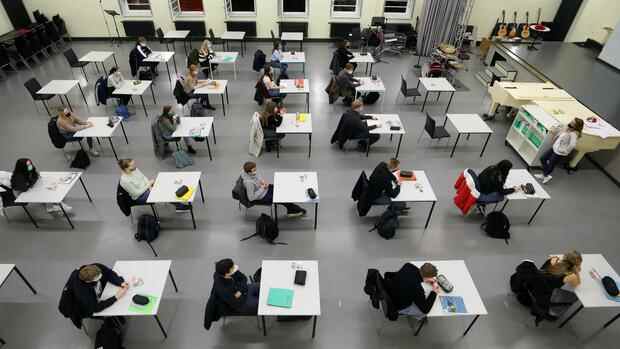The future federal government wants to finance the purchase of new hardware and the replacement of outdated technology.
(Photo: dpa)
Berlin The traffic light coalition is planning a new start with the digitization of schools: A Digital Pact 2.0 should permanently provide the necessary funds – and at the same time ensure that these are accessed quickly. A new survey of high school teachers shows how urgently this is needed: Almost every second teacher still says that they teach in schools where the WiFi does not work or does not work properly.
Almost two thirds of the approximately 7,000 educators surveyed cannot rely on the help of a professional IT staff, according to a survey by the Association of Philologists (DPhV). Just under 23 percent of those surveyed stated that they could benefit from a professional administrator.
A good 43 percent of teachers have still not received a digital device from their employers. “After more than 20 months of pandemic, this is a sign of poverty for those politically responsible,” said the federal chairman of the association, Susanne Lin-Klitzing. “Schools must be equipped with less red tape, faster and better.”
Only one eighth of 6.5 billion euros in funding has been paid out
It’s not about the money: The digital pact, now worth 6.5 billion euros, was launched at the beginning of 2019. At first, however, the funds only flowed off in droplets. Nothing came of the “crazy catch-up” that the incumbent President of the Education Ministers promised at the beginning of 2021: Although digital teaching suddenly turned from a nice accessory to an essential tool during the pandemic, only 851 million had flowed out by the end of June this year.
Top jobs of the day
Find the best jobs now and
be notified by email.
The reason given by the federal states was that the schools were busy with other things because of the pandemic. The municipalities complained about bureaucratic obstacles – and the risk of being left with the follow-up costs of digitizing schools in the medium term. The ministers of education have therefore long been calling for a digital pact 2.0.
The traffic light coalition wants to fulfill this wish and “support the federal states and municipalities permanently with the digitization of the education system”, it says in the coalition agreement. The Digital Pact 2.0 should run until 2030.
This will then also finance the “sustainable purchase of new hardware, the replacement of outdated technology as well as device maintenance and administration”. In addition, students in need should continue to have free access to laptops, for example.
After all, two thirds of teachers report learning platforms that comply with data protection regulations
At the same time, new mechanisms should ensure that the funds flow away more effectively. Find solutions “in the first half of 2022”. “Service, advice and networking offers” are to be created for on-site support. Together with the federal states, the federal government is to promote competence centers for digital and digitally supported teaching in schools and further education and also create a central contact point for learning and teaching in the digital world.
The survey by the Association of Philologists had a positive result: a good 69 percent of the secondary school teachers surveyed can now work in their schools with suitable learning platforms that comply with data protection regulations. For almost 14 percent, however, this was still not the case. In many cases, data protection officers objected to the use of programs from US providers such as Microsoft or Zoom.
Germany was ten years ago when it came to school clouds and platforms
“In the somewhat calmer phase of the pandemic, almost all state governments also failed to put the use and handling of digital media on a legally viable footing,” criticized Lin-Klitzing. “The Philologists’ Association once again calls on the state governments not to continue to criminally neglect the rights of co-determination of the staff councils and finally to conclude the necessary service agreements. School administrators and teachers are still left alone here in a legally free area. “
According to a study by the Telekom Foundation, there is currently “cabbage and beets” on school platforms, said its chairman Thomas de Maizière recently. Therefore, it must be ensured as soon as possible that at least “the interfaces and standards work”.
Overall, according to the study, Germany is around ten years behind when it comes to platforms or school clouds in an international comparison. The federal government now wants to work with the federal states to support digital program structures and platforms for open educational resources as well as the development of intelligent, license-free teaching and learning software. In addition, he wants to help set up positive lists with data protection-compliant, digital teaching and learning aids, according to the coalition agreement.
More: Here you can read what else the coalitionists have agreed on

